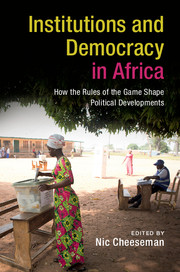Book contents
- Frontmatter
- Dedication
- Contents
- List of Figures
- List of Tables
- List of Contributors
- 1 Introduction: Understanding African Politics: Bringing the State Back In
- Part I Institutional Foundations
- Part II Law and Order
- 5 Constitutions: The Politics of Constitutional Reform
- 6 The Police: Laws, Prosecutions and Women's Rights in Liberia
- 7 The Bureaucracy: Policy Implementation and Reform
- Part III Elections, Parties and Political Competition
- Part IV Countervailing Institutions
- Index
- References
7 - The Bureaucracy: Policy Implementation and Reform
from Part II - Law and Order
Published online by Cambridge University Press: 05 February 2018
- Frontmatter
- Dedication
- Contents
- List of Figures
- List of Tables
- List of Contributors
- 1 Introduction: Understanding African Politics: Bringing the State Back In
- Part I Institutional Foundations
- Part II Law and Order
- 5 Constitutions: The Politics of Constitutional Reform
- 6 The Police: Laws, Prosecutions and Women's Rights in Liberia
- 7 The Bureaucracy: Policy Implementation and Reform
- Part III Elections, Parties and Political Competition
- Part IV Countervailing Institutions
- Index
- References
Summary
New bureaucratic agencies – most commonly central banks, privatisation agencies and regulatory commissions – multiplied across Africa following the adoption of neoliberal reforms in the mid-1980s and 1990s. The theoretical inspiration behind the creation of these agencies was that economic reforms would be more successful if those who implemented them were professionally trained ‘technocrats’ institutionally insulated from the push and pull of everyday politics (Williamson 1993; White and Bhatia 1998). Concerns about bureaucratic independence have been particularly acute in Africa because bureaucratic institutions are perennially perceived as corrupt and inefficient. For example, the World Bank's 2014 World Governance Indicators (a largely perceptual metric), put sub-Saharan Africa last among all regions in ‘government effectiveness’, ‘regulatory quality’ and ‘control of corruption’ (see Figure 7.1) – aspects of governance associated with the quality of bureaucratic institutions.
Despite their widespread proliferation, we know little about where and why independent bureaucratic agencies were created; how independent or insulated the bureaucrats who staffed them were; and how effective the agencies were at accomplishing the tasks for which they were designed. This chapter explores the myriad dimensions of bureaucratic politics and technocratic practice through an examination of privatisation agencies.
Arguments about the value of technically competent, independent bureaucrats have a long lineage in political science. Theorists from Friedrich Hegel to Max Weber to Woodrow Wilson have advocated for a bureaucracy with specialised knowledge and the legitimate authority to administer policy free from interference by politicians (Wilson 1887; Weber 1978). During the 1980s and 1990s, supporters of neoliberalism seized on this notion to advocate for the creation of formally independent agencies to handle sales of state-owned enterprises in Africa. Their justification rested on several claims. First, the process of economic liberalisation is complex and requires a high degree of technical acumen. The formation of an agency staffed by technocrats was expected to increase the likelihood that liberalisation would proceed quickly and successfully (White and Bhatia 1998; Kayizzi-Mugerwa 2003).
Second, independent bureaucracies guard against coalitional drift. In the event of a turnover of the party in power, the presence of an agency increases the possibility that economic reforms will continue (Shepsle 1992). Third, formally independent bureaucratic agencies are a signal to investors that a government has credibly committed to reform (Brune et al. 2004).
- Type
- Chapter
- Information
- Institutions and Democracy in AfricaHow the Rules of the Game Shape Political Developments, pp. 160 - 188Publisher: Cambridge University PressPrint publication year: 2018
References
- 1
- Cited by



